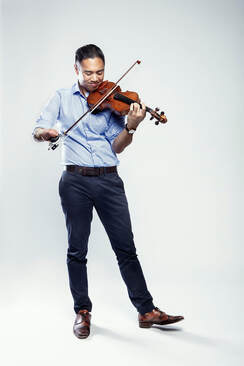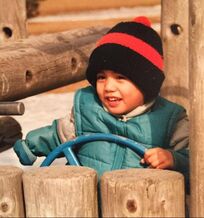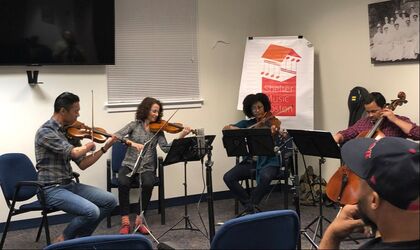 Photo by Scott Noble
Photo by Scott Noble Tell us a little about your background.
I was born in Ottawa, Canada. I moved to Toronto to get a little bit more support because I was born with a disability - I’m missing my right hand. During that time I was fortunate enough to be able to start the violin using an adaptation for my bow. That led me to going to school for music performance so I moved down to Philadelphia and then finished my masters in New Haven. I was trying to figure out what to do with my life afterwards so I ended up majoring in education. I went to Harvard Graduate School of Education which is what landed me in Boston. I then started teaching and doing some program leadership for a few years. That’s what I’m doing now at a school called Milton Academy. I chair the music department. This has been my 4th year. I also founded and run the Music Inclusion Program. It’s a non-profit that is based in Dorchester that serves students with disabilities. I continue to play from time to time around the world, but I think some of my most meaningful concerts over the last few years have been involved with Shelter Music Boston, just going to shelters, like CASPAR and Pine Street Inn, to be able to deliver programs for folks who have various challenges with transitional housing and struggling with other aspects of life that I think are very resonant with things that we struggle with as well. To be able to share music in a way that really brings all the people in as equals has been really lovely.
I was born in Ottawa, Canada. I moved to Toronto to get a little bit more support because I was born with a disability - I’m missing my right hand. During that time I was fortunate enough to be able to start the violin using an adaptation for my bow. That led me to going to school for music performance so I moved down to Philadelphia and then finished my masters in New Haven. I was trying to figure out what to do with my life afterwards so I ended up majoring in education. I went to Harvard Graduate School of Education which is what landed me in Boston. I then started teaching and doing some program leadership for a few years. That’s what I’m doing now at a school called Milton Academy. I chair the music department. This has been my 4th year. I also founded and run the Music Inclusion Program. It’s a non-profit that is based in Dorchester that serves students with disabilities. I continue to play from time to time around the world, but I think some of my most meaningful concerts over the last few years have been involved with Shelter Music Boston, just going to shelters, like CASPAR and Pine Street Inn, to be able to deliver programs for folks who have various challenges with transitional housing and struggling with other aspects of life that I think are very resonant with things that we struggle with as well. To be able to share music in a way that really brings all the people in as equals has been really lovely.

What’s your first musical memory?
I think probably singing to the radio when I was a young kid. I remember being on a flight going to Hong Kong and just being astounded by the amount of music that you could get at the back of a seat while flying 30,000 feet in the air. I thought that was great. I was literally on cloud nine.
What drew you to Shelter Music Boston’s work?
I think it was the idea of translating privilege to service. That’s something that I always want to be doing due to my success despite the challenges I’ve had. When I moved to Boston I did some digging and research about various organizations that were really centering their practice around service and citizen artistry and Shelter Music Boston came up and I just had to learn more about them. I reached out to Julie Leven, and we’ve known each other now for 3 years.

Tell us about a special SMB concert memory.
Every single one is memorable in some way. I think the first concert that I did was particularly memorable. I was practicing and waiting in one of the offices at the Pine Street Inn and just seeing inspirational quotes around me that were completely geared towards the residents of the shelter, but I remember taking photos and really being inspired and thinking, “Wow this a place where I’m learning so much already and I haven’t even started playing yet.”
I think another one was playing at the CASPAR Emergency Shelter and that was a challenge because I remember that in the middle of our concert paramedics were coming in because one of the residents had some type of a medical issue. We were trained specifically by Julie just to keep on playing. It was literally the show must go on type mentality when we were engaged in this work and I realized that this is not a concert where everyone is going to be completely still or silent like you would in a concert hall and that’s ok in some ways. That added a sort of determination to our music to really play for the sake of knowing that what we were doing was bigger than ourselves. I really loved the authenticity and realness of that and just really framing why we’re doing this because there were folks that need this aspect of humanity in their lives through music, something that I know has benefited me greatly, and I hope that we’ve done the same for the people in the shelters as well.
What are you most looking forward to as you step into this new role as Artistic Director?
Getting to know a larger community of artists. There are over 50 that are around Boston who are deeply engaged with understanding the connection between service, citizen artistry, and classical music in particular. To be able to know that there are other folks that are out there and we’re all working together to really deliver this essential service to the city of Boston, a city that we all love, is very galvanizing. I’ve always done so much of my work in isolation and sometimes it can be a very isolating and lonely experience but it's great to know that there are other people who are like minded and draw from their energy and their ideas and organize them in a way that really amplifies their voices. That’s the real joy in the work - to understand that we’re a big team, a cohort of people who are really trying to do something good in this work. I’m excited to actually perform in person at some point as well. I think that’s a big one for all of us to especially make real connections to the people on the ground. I think that will be so cathartic when we can actually do what I was doing 2 years ago in the shelters.
Every single one is memorable in some way. I think the first concert that I did was particularly memorable. I was practicing and waiting in one of the offices at the Pine Street Inn and just seeing inspirational quotes around me that were completely geared towards the residents of the shelter, but I remember taking photos and really being inspired and thinking, “Wow this a place where I’m learning so much already and I haven’t even started playing yet.”
I think another one was playing at the CASPAR Emergency Shelter and that was a challenge because I remember that in the middle of our concert paramedics were coming in because one of the residents had some type of a medical issue. We were trained specifically by Julie just to keep on playing. It was literally the show must go on type mentality when we were engaged in this work and I realized that this is not a concert where everyone is going to be completely still or silent like you would in a concert hall and that’s ok in some ways. That added a sort of determination to our music to really play for the sake of knowing that what we were doing was bigger than ourselves. I really loved the authenticity and realness of that and just really framing why we’re doing this because there were folks that need this aspect of humanity in their lives through music, something that I know has benefited me greatly, and I hope that we’ve done the same for the people in the shelters as well.
What are you most looking forward to as you step into this new role as Artistic Director?
Getting to know a larger community of artists. There are over 50 that are around Boston who are deeply engaged with understanding the connection between service, citizen artistry, and classical music in particular. To be able to know that there are other folks that are out there and we’re all working together to really deliver this essential service to the city of Boston, a city that we all love, is very galvanizing. I’ve always done so much of my work in isolation and sometimes it can be a very isolating and lonely experience but it's great to know that there are other people who are like minded and draw from their energy and their ideas and organize them in a way that really amplifies their voices. That’s the real joy in the work - to understand that we’re a big team, a cohort of people who are really trying to do something good in this work. I’m excited to actually perform in person at some point as well. I think that’s a big one for all of us to especially make real connections to the people on the ground. I think that will be so cathartic when we can actually do what I was doing 2 years ago in the shelters.
What is your favorite performance you’ve ever attended? What made it so special?
The most recent one was when I was teaching at Tanglewood. One of the students performers, a violist, played a viola romance. That was the last time I actually cried during a concert which is why it was memorable. It was just so moving to see young people in particular pour their hearts and energy into a piece that connects with them and to know that the work that we’re doing in education and the work that they’re doing as young people is really making all of us better. That was particularly memorable. I don’t think I have a favorite in that sense which is great because it means that we’re always in this position to be reinspired and reinvigorated when we go see a concert.
What is your favorite performance you’ve ever given?
When I was young and at summer camp, those are the most memorable in terms of when you’re young and you’re just playing for the joy. I remember playing Shostakovich’s 8th string quartet in a quasi-outdoor performance. During that time there was a thunderstorm going on and we were playing such dark music and in the middle of the piece where it was really intense the lightning would strike 15 feet away. It was in the upstate New York area so it was really close and we still had to keep going. The piece ends in silence, you just wait 20 seconds afterwards of pure silence, but all you could hear was the rain and the thunder in the background. It was just chilling how special that moment was as we waited for the final applause.
What 5 albums would you take with you to a deserted island?
The most recent one was when I was teaching at Tanglewood. One of the students performers, a violist, played a viola romance. That was the last time I actually cried during a concert which is why it was memorable. It was just so moving to see young people in particular pour their hearts and energy into a piece that connects with them and to know that the work that we’re doing in education and the work that they’re doing as young people is really making all of us better. That was particularly memorable. I don’t think I have a favorite in that sense which is great because it means that we’re always in this position to be reinspired and reinvigorated when we go see a concert.
What is your favorite performance you’ve ever given?
When I was young and at summer camp, those are the most memorable in terms of when you’re young and you’re just playing for the joy. I remember playing Shostakovich’s 8th string quartet in a quasi-outdoor performance. During that time there was a thunderstorm going on and we were playing such dark music and in the middle of the piece where it was really intense the lightning would strike 15 feet away. It was in the upstate New York area so it was really close and we still had to keep going. The piece ends in silence, you just wait 20 seconds afterwards of pure silence, but all you could hear was the rain and the thunder in the background. It was just chilling how special that moment was as we waited for the final applause.
What 5 albums would you take with you to a deserted island?
- Cinema Serenade by Itzhak Perlman & John Williams
- Billie Holiday Standards
- Sibelius Violin Concerto by Christian Ferras
- Mahler Symphony No. 10 by the Vienna Philharmonic, Claudio Abbado conducting
- Bach: The Goldberg Variations (1956 edition) by Glen Gould

 RSS Feed
RSS Feed











